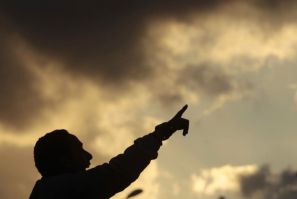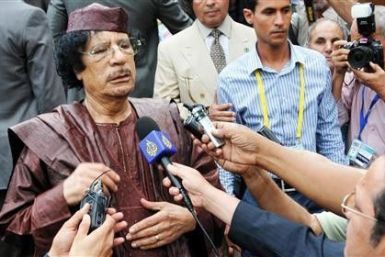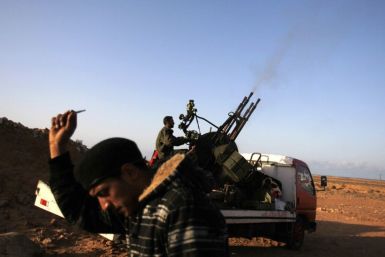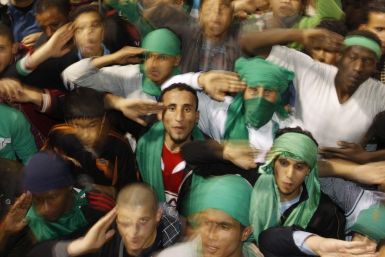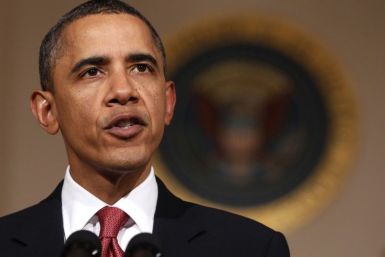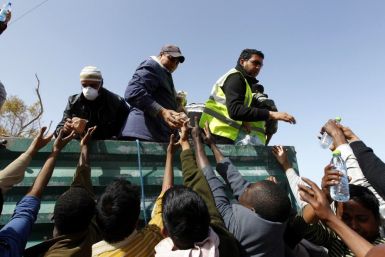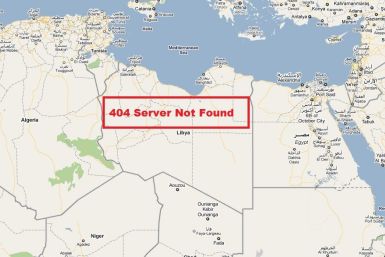U.S. stocks were flat on Tuesday as continued turmoil in Libya indicated a quick resolution to the unrest in that country was not on the horizon and a drop in oil prices failed to ease investor worry about the economic recovery.
U.S. stock index futures pointed to a flat open on Tuesday as more turmoil in Libya indicated a resolution was not close and a drop in oil prices failed to ease investor worry about the economic recovery.
Confusion reigns in Libya over whether Moammar Gaddafi offered rebel leaders a peace deal or not.
OPEC is in consultations regarding a potential boost in oil output but hasn't decided whether to approve one, Kuwait's Oil Minister said on Tuesday.
U.S. stocks ended lower on Monday, led by declines from technology shares after Wells Fargo downgraded the semiconductors sector.
Oil fell from recent highs on Tuesday on reports that OPEC may boost production, prompting some recovery on equity markets.
Members of oil cartel OPEC are joining Saudi Arabia in raising output to cool soaring prices and allay fears of a supply crunch in the West, the Financial Times newspaper reported on Tuesday.
Emerging market economies that powered the global recovery may be growing too fast for their own good as inflation pressures build, a top International Monetary Fund official said on Monday.
Brent crude oil prices fell more than 1 percent on Monday, reversing steep early gains as traders assessed efforts to stem the conflict in Libya and took profits in Brent's unprecedented premium to U.S. futures.
OPEC member Algeria is concerned about Libyan supply disruptions but sees no physical crude oil shortages globally, the country's oil minister said on Monday.
Libyan leader Muammar Gaddafi was looking for an agreement allowing him to step down, said Al Jazeera quoting sources in the governing council.
Fast-growing emerging market economies are beginning to exhibit signs of overheating, a top International Monetary Fund official said on Monday.
The six Persian Gulf states have expressed their support for the establishment of a no-fly zone over Libya, while the U.S., U.K. and France try to hammer out an agreement with the United Nations for just such a measure.
Fast-growing emerging market economies are beginning to exhibit signs of overheating, a top International Monetary Fund official said on Monday.
There are no good outcomes, only bad, really bad, and catastrophic. Take your pick. Could gas prices drop below $3.00 per gallon if the world sinks back into recession? Yes. But it would only be momentary. The easy to access supply is dwindling. The medium and long term direction of gas at the pump is up. There is nothing that can be done in the next five years to prevent significantly higher oil prices.
After 19 months, the Iranian government restored access to YouTube, roughly coinciding with the anniversary of the Islamic revolution.
For most outsiders, Libya means just two things: oil and Moammar Gaddafi. But Libya is much more than that.
Brent crude prices reversed after jumping back above $118 a barrel on Monday, and U.S. oil pared gains after concerns about Libya's conflict and the threat of wider supply disruptions in the Middle East lifted it to the highest level since September 2008.
President Barack Obama said the U.S. and its NATO allies are weighing wide range of potential options (including military intervention) to pressure Libyan leader Moammar Gaddafi from committing any further acts of unacceptable against the opposition rebels.
Wall Street bank Morgan Stanley has stopped trading oil with Libya, a trade source said on Monday, in an early indication that U.S. sanctions could further hit exports from the north African producer.
The United Nations said it will be sending a team of specialists to assess the humanitarian crisis in Libya, as thousands of foreigners remain trapped in the country and fighting intensifies between forces opposed to and loyal to Moammar Gaddafi.
Isolated spikes of Internet activity showed up in Libya over the weekend, according to Google's Transparency Report, but it is intermittent and Libya is still largely cut off from the rest of the world.




